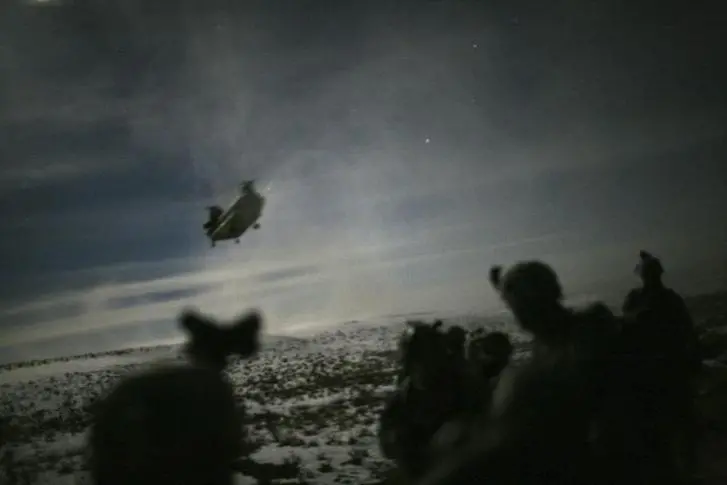PHOTO
There was little surprise in President Joe Biden’s announcement last week that the US will unconditionally withdraw all its military forces from Afghanistan by September and end its “forever war.” The US president had long been of the view that retaining troops in Afghanistan was not only untenable but had lost any rationale once the Al-Qaeda threat had been downgraded. That is how he framed it in his much-anticipated address.
“We delivered justice to Osama bin Laden a decade ago,” he said, but “stayed in Afghanistan for a decade since… Our reasons for remaining in Afghanistan have become increasingly unclear.” He added another compelling reason for his decision: The new strategic challenges that Washington needed to focus on.
To pre-empt expected domestic criticism, especially in view of the Pentagon’s advice of a gradual conditions-based drawdown, he said: “We cannot continue the cycle of extending or expanding our military presence in Afghanistan hoping to create the ideal conditions for our withdrawal, expecting a different result.”
With this announcement, the US is set to start pulling out its forces on May 1 and complete the drawdown by Sept. 11, the 20th anniversary of the attacks on America that led to the invasion of Afghanistan.
What does this mean for the future stability of Afghanistan? How will this affect the Afghan peace process, which has been deadlocked for months now? What of the peace plans Washington unveiled more than a month ago, which envisaged UN-mediated talks between the Afghan parties in Turkey, scheduled for April 24 to May 4, as well as a conference of regional states to mobilize consensus to support the peace process?
The Taliban, even before Biden’s announcement, said it would not participate in the talks in Turkey and threatened “consequences” if the withdrawal deadline agreed in the February 2020 US-Taliban Doha accord was shifted. Its initial response to Biden’s announcement reiterated the position that a delay in the withdrawal was a violation of the Doha agreement, which freed the group to take “every necessary countermeasure.”
Otherwise, the statement was nuanced enough to leave space open for diplomatic engagement. It is possible that the Taliban might come round to accepting the new drawdown end date, as it is clear and unconditional, and also rethink its participation in the Istanbul conference. Having won international recognition, the Taliban is unlikely to risk losing it by adopting an intransigent stance. Their leaders may also see this as an opportunity and therefore take a restrained position.
The focus will now be on the upcoming diplomatic parley in Turkey — the Istanbul Conference on the Afghan Peace Process — which aims to accelerate the intra-Afghan dialogue and take it forward from where it was left in Doha last November. The prolonged impasse has had much to do with the wait-and-see posture adopted by both parties in light of the new US administration’s review of its Afghan policy. The UN mission has described the Istanbul conference as an “important opportunity to put in place a concrete plan to end the war.”
The indications are that the US will intensify its diplomacy to push the Afghan parties to break the stalemate in Istanbul and then start substantive negotiations in Doha. Whether the announcement that the Americans are leaving will force the Afghan parties toward accommodation, as some hope, is yet to be seen. What is known about the UN-led peace summit is that talks between the Afghan government and the Taliban will be preceded by a meeting of foreign ministers and representatives of regional states, which is expected to evolve a “unified approach” in support of an inclusive peace process and a call for a reduction in violence.
One of the critical factors in whether the Turkey peace process will succeed — or even start — is how seriously the US engages, especially the pressure it brings to bear on President Ashraf Ghani to abandon his uncompromising stance and how the Taliban plays its cards. US special envoy Zalmay Khalilzad is in the region intensifying efforts to persuade the two sides to go to the Istanbul conference with an open mind, which is a formidable task. The US certainly has an interest in leaving Afghanistan having achieved progress in negotiations for a peace settlement. But the question is how much leverage does it have now that it is leaving and what tools is it prepared to use to achieve a last-ditch outcome?
As for the Taliban’s leaders, who have been wily negotiators, the unanswered question is whether they will be able to resist the view of those among them who may want to wait for the Americans to depart and see no value in resuming the intra-Afghan dialogue. On the other hand, the Taliban leaders may calculate that, after two decades of military struggle, the opportunity to secure their desired outcome also presents itself through negotiations — an option that would help them receive the international support and assistance they will need in post-American Afghanistan and, most importantly, offer a better chance of achieving lasting peace.
The danger, however, is that if the path of negotiations is spurned and talks fail, Afghanistan could once again descend into chaos and a bloody civil war that would only prolong the tragedy for its long-suffering people, who yearn for peace. In that case, Afghanistan’s “forever war” will continue, even as America’s ends.
- Maleeha Lodhi is a former Pakistani ambassador to the US, UK & UN. Twitter @LodhiMaleeha
Copyright: Arab News © 2021 All rights reserved. Provided by SyndiGate Media Inc. (Syndigate.info).





















